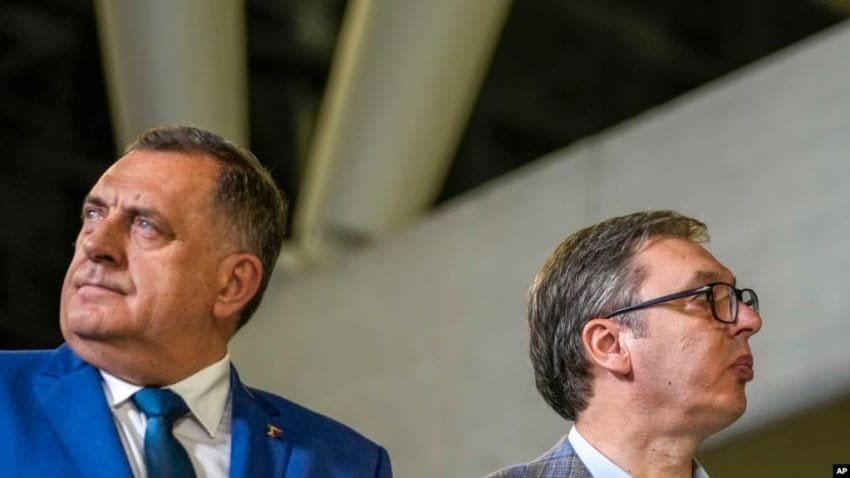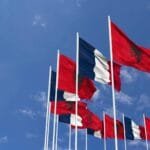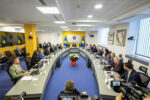Officials from the Serbian government said that Serbian President Aleksandar Vučić sent a letter on Friday to French President Emmanuel Macron, German Chancellor Olaf Scholz, and other European leaders to oppose Kosovo’s accession to the Council of Europe, despite Western calls for the implementation of the agreement to normalize relations with Kosovo, which requires parties not to hinder each other in integration processes.
On Friday, the Serbian president met with the Chinese ambassador in Belgrade, Li Ming, to seek China’s support in Serbia’s efforts against the possible adoption of a resolution at the United Nations General Assembly on genocide in Srebrenica.
President Vučić has described these two issues as “serious challenges” for Serbia. Last week, he ordered his government to establish a working group to oppose Kosovo’s accession to the Council of Europe, while the Parliamentary Assembly of this mechanism is expected to vote on April 16, and then the issue goes to the Council of Ministers.
On Thursday evening, the Serbian president, who gathered the leaders of his government and those of the Republic of Serbia in Belgrade, reiterated the possibility of his country withdrawing from the Council of Europe if Kosovo becomes a member, while sharply criticizing key Western countries that criticized the Serbian List in Kosovo for its calls to boycott the vote for the dismissal of mayors in four municipalities in northern Kosovo.
“They should be ashamed,” he said, accusing Westerners of wanting to make Kosovo part of the Council of Europe “without fulfilling the conditions,” emphasizing the Association of municipalities with a Serbian majority.
On March 27, the Committee on Political and Democracy gave the green light to Kosovo’s membership request in the Council of Europe. Serbia voted against it.
The committee said after the vote that it welcomes a broad list of pledges made in writing by Kosovo authorities, while emphasizing that the establishment of the Association of municipalities with a Serbian majority should be a “commitment after membership” for Kosovo, which would help ensure the protection of the rights of Kosovo Serbs.
The “Quint” countries, as the main Western five, composed of the United States, France, Germany, Italy, and the United Kingdom, see Kosovo’s accession to the Council of Europe as a lever to exert pressure on the government of Prime Minister Albin Kurti to take steps towards establishing the Association, which is also the most difficult point in Kosovo-Serbia negotiations.
Serbian President Vučić met with the Chinese ambassador in Belgrade on Friday to seek China’s support “in the fight for truth before the United Nations.”
On April 17, a draft resolution is expected to be presented at the UN declaring April 11 as the International Day of Remembrance of the Srebrenica Genocide. Rwanda and Germany are leading this effort, but according to information provided by Voice of America, part of this initiative also includes the United States, Albania, Bosnia, Chile, Finland, New Zealand, Turkey, France, and other countries.
On July 11, 1995, more than 8,000 Bosnian Muslim men and boys were executed by Bosnian Serb forces in Srebrenica. Despite international court rulings that genocide was committed in Srebrenica, Belgrade denies such a thing.
Former Bosnian Serb leaders Radovan Karadžić and military commander Ratko Mladić have been sentenced to life imprisonment by the UN court for war crimes in the former Yugoslavia, for war crimes and genocide in Srebrenica.
The Serbian president described the initiative for the resolution at the UN as “shameless,” emphasizing that Serbia “will oppose NATO countries, from Germany to Turkey.”
Pro-Russian President of the Republic of Srpska, Milorad Dodik, warned that his entity’s parliament would take steps to abandon decision-making institutions in Bosnia if the resolution passes, which he says “aims to make Serbs collectively guilty of genocide,” denying again that this happened in Srebrenica.
Milorad Dodik is under sanctions from the United States and the United Kingdom for attempting to secede his entity and unite it with Serbia.
The government of the Republic of Srpska began the process of adopting its electoral law at the end of March, aiming to take powers away from the central authorities of Bosnia.
On Friday, the US embassy in Sarajevo said that the creation of a parallel electoral system by the government of the Republic of Srpska would be unconstitutional and against the Dayton Agreement, which ended the war in Bosnia in 1995.
“Milorad Dodik is mistaken if he thinks the United States will stand aside while he pursues his divisive agenda and pushes Bosnia towards conflict,” said a post by the US embassy distributed on Network X, emphasizing that “any attempt by an entity or another sub-national unit to secede is an action against Dayton that will not be tolerated.”
The West is concerned that Russia may try to instigate instability in Bosnia to divert attention from the conflict in Ukraine. Bosnia remains ethnically tense and politically fragile after the 1992-1995 war, which left more than 100,000 dead and millions displaced.







